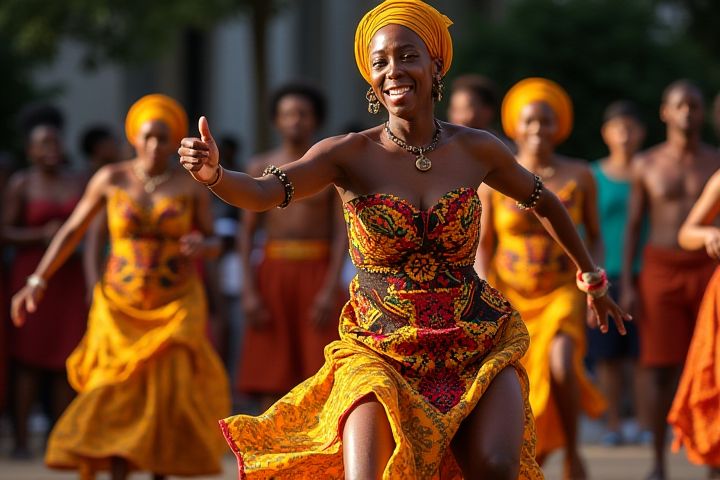
Nigerian dance is a vibrant expression of culture, showcasing a rich tapestry of traditional and contemporary styles. Each ethnic group contributes unique movements, with the Yoruba, Igbo, and Hausa dances being particularly prominent. Celebrations such as weddings and festivals feature energetic performances, often accompanied by live drumming and traditional music. The use of colorful costumes enhances these performances, making them visually stunning experiences. Engaging in Nigerian dance not only promotes physical fitness but also connects you to the country's rich cultural heritage.
Traditional Heritage
Nigerian dance embodies a rich tapestry of cultural heritage, showcasing diverse ethnic groups such as the Yoruba, Igbo, and Hausa, each with unique rhythmic patterns and movements. Traditional dances like the Eyo and Atilogwu serve not only as entertainment but also as ceremonial expressions, reflecting the community's historical narratives and social values. Costumes, often vibrant and intricately designed, play a crucial role in these performances, symbolizing status and cultural identity. Engaging in Nigerian dance allows you to experience the profound connection between movement, music, and the storytelling traditions of this vibrant nation.
Regional Variations
Nigerian dance showcases a rich tapestry of regional variations, each reflecting the unique cultural heritage of its communities. The Yoruba dance often features intricate hip movements and vibrant costumes, highlighting spiritual narratives and social themes. In contrast, the Igbo dance emphasizes energetic jumps and communal participation, frequently performed during festivals and celebrations. The Northern regions contribute with traditional dances like the Arewa, which incorporates storytelling through rhythmic body movements and drumming, creating a diverse landscape of expression in Nigerian performing arts.
Ceremonial Dances
Nigerian ceremonial dances are integral to the country's rich cultural heritage, showcasing various ethnic groups and their traditions. Typically performed during significant events such as weddings, funerals, and festivals, these dances often feature vibrant costumes and intricate choreography that reflect ancestral stories and community values. Instruments like drums, flutes, and gongs enhance the rhythmic experience, creating a dynamic atmosphere that encourages communal participation. Engaging in these dances not only preserves age-old customs but also fosters a deeper understanding of Nigeria's diverse cultural landscape.
Music Integration
Nigerian dance is deeply rooted in the country's diverse musical landscape, showcasing a rich tapestry of cultural expressions. Traditional genres like Afrobeats, Highlife, and Juju music often accompany vibrant dance performances, creating a harmonious synergy that captivates audiences. The rhythmic patterns and unique beats of these musical styles inspire movements that reflect specific emotions, stories, and social themes. Engaging in Nigerian dance not only enhances your physical coordination but also connects you to the cultural narratives that shape Nigeria's identity.
Storytelling Elements
Nigerian dance embodies rich storytelling elements that reflect the country's diverse cultures and traditions. Each movement conveys narratives rooted in historical events, social issues, and community values, often accompanied by traditional music and vibrant costumes. These dances, from the energetic Zanku to the intricate Eyo, serve as a medium for expressing emotions and cultural heritage. You can experience the profound connection between the performers and their stories, fostering a deeper understanding of Nigerian identity and communal spirit.
Rhythm and Movement
Nigerian dance is deeply rooted in cultural traditions, with a strong emphasis on rhythm and movement. Each regional style, from the energetic Yoruba dances to the intricate movements of the Igbo, highlights unique societal values and storytelling techniques. Drumming, often performed live, provides a captivating auditory backdrop that inspires dynamic choreography and improvisation. Engaging in these dances not only connects you to Nigeria's rich heritage but also fosters a vibrant communal spirit.
Cultural Festivals
Nigerian dance serves as a vibrant expression of cultural identity, often showcasing at various cultural festivals across the country. Each festival features distinct traditional dances that reflect the unique heritage, beliefs, and histories of Nigeria's diverse ethnic groups, such as the Yorubas, Igbos, and Hausas. These performances are typically accompanied by traditional music played on instruments like the talking drum, shekere, and udu, enhancing the overall sensory experience. By participating in these cultural festivals, you can immerse yourself in Nigeria's rich artistic traditions and witness firsthand the communal spirit that these dances foster.
Contemporary Dance
Contemporary Nigerian dance blends traditional elements with modern techniques, showcasing vibrant expressions through movement. This dynamic art form often incorporates Afrobeat rhythms, encouraging fluidity and improvisation that resonate with both personal and cultural narratives. You can witness performances that not only highlight skillful choreography but also celebrate Nigeria's rich diversity by featuring various regional styles. Classes and workshops throughout the country contribute to the growing popularity of contemporary dance, attracting enthusiasts eager to explore its innovative fusion of history and modernity.
Costume and Attire
Nigerian dance is a vibrant expression of cultural heritage, with costumes playing a pivotal role in enhancing performances. Traditional attire often features brightly colored fabrics, intricate beadwork, and unique patterns that reflect the dancer's ethnic background, such as the Yoruba, Igbo, or Hausa. Each costume not only serves as a visual spectacle but also holds symbolic meanings, representing various aspects of life, spiritual beliefs, and social status. When you engage with Nigerian dance, the beauty of these costumes deepens your appreciation for the rich traditions and storytelling inherent in each movement.
Ethnic Diversity
Nigerian dance reflects the country's rich ethnic diversity, showcasing a multitude of styles originating from over 250 ethnic groups. Traditional dances such as the Atilogwu from the Igbo, the Bata from the Yoruba, and the Kete from the Akan embody cultural narratives, rituals, and historical significance. These dances often feature vibrant costumes and rhythmic music that resonate with the unique customs and values of each tribe. Engaging in these traditional forms not only preserves heritage but also fosters a sense of community and identity among participants and audiences alike.
